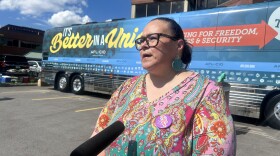With some Kentucky businesses and politicians calling for the state to end the weekly $300 supplement to unemployment benefits, a group of 17 unions, churches and nonprofits are urging Gov. Andy Beshear to keep it.
The group includes the Kentucky AFL-CIO, the Jefferson County Teachers Association, United Mine Workers of America and IATSE Local 28, which represents theater stagehands. They sent a letter to Beshear saying the enhanced benefits have helped people who have been laid off and unable to find work during the pandemic.
Beshear, a Democrat, has said the state will continue to participate in the program, despite escalating claims from businesses and Republicans that the benefit is causing a worker shortage.
Jason Bailey is the executive director of the Kentucky Center for Economic Policy, which also signed on to the effort. He says eliminating the benefit would hurt workers and the state’s economic recovery.
“Now’s not the time to take away a benefit that circulates through the whole economy and is helping spur that recovery. It will just make the recovery slower, longer and more painful, and it will hurt families that are still struggling,” Bailey said.
So far, 23 states have signaled they will end the federally backed enhancement of unemployment benefits by June.
Beshear said last week he plans to stick with the $300 per week boost to benefits, which were extended until September under the latest coronavirus relief bill that passed out of Congress in March.
Beshear said the enhanced benefits are adding about $34 million per week into the economy.
“An immediate termination of those extra benefits would hurt our economy and hurt a lot of groups, restaurants and others that have suffered during this pandemic,” Beshear said.
But calls to eliminate the supplement have been growing among Kentucky’s elected Republicans.
Rep. Russell Webber, a Republican from Shepherdsville and chair of the House Workforce Investment Committee, said the benefits are causing a labor shortage that’s harming businesses.
“States across our nation announce plans to shed pandemic-related requirements, vaccines are widely available, and life returns to normal. However, Kentucky businesses are facing a different reality as they struggle to find employees,” Webber said in a statement.
In a speech last week, Senate Minority Leader Mitch McConnell said the government is taxing working people to “pay others a bonus to stay home.”
“We all knew what would happen. But Democrats insisted on continuing to pay people more not to work,” McConnell said.
Kentucky logged one of the largest drops in unemployment claims in the nation last month—the state’s unemployment rate was 4.7% in April compared to the nation’s 6.1%.
Still, the number of people estimated to be employed or looking for work—the civilian labor force—declined by 796 people from March to April to 1,989,946.
The Kentucky Chamber of Commerce released a report last week suggesting the state’s low labor force participation rate suggests many laid-off workers aren’t looking for employment compared to the rest of the nation.
“These individuals might not be looking for work for several reasons including lack of child-care, health and safety concerns, and enhanced unemployment insurance benefits,” the report states.
“If these individuals were counted in the unemployment numbers, Kentucky’s unemployment rate might be similar to the nation’s rate.”
Bailey, with the Kentucky Center for Economic Policy, said employers worried about a labor shortage should consider paying employees better instead of blaming generous unemployment benefits.
“They should’ve been doing that in general, but it’s not a reason to end a benefit that is so important to our recovery,” Bailey said.





